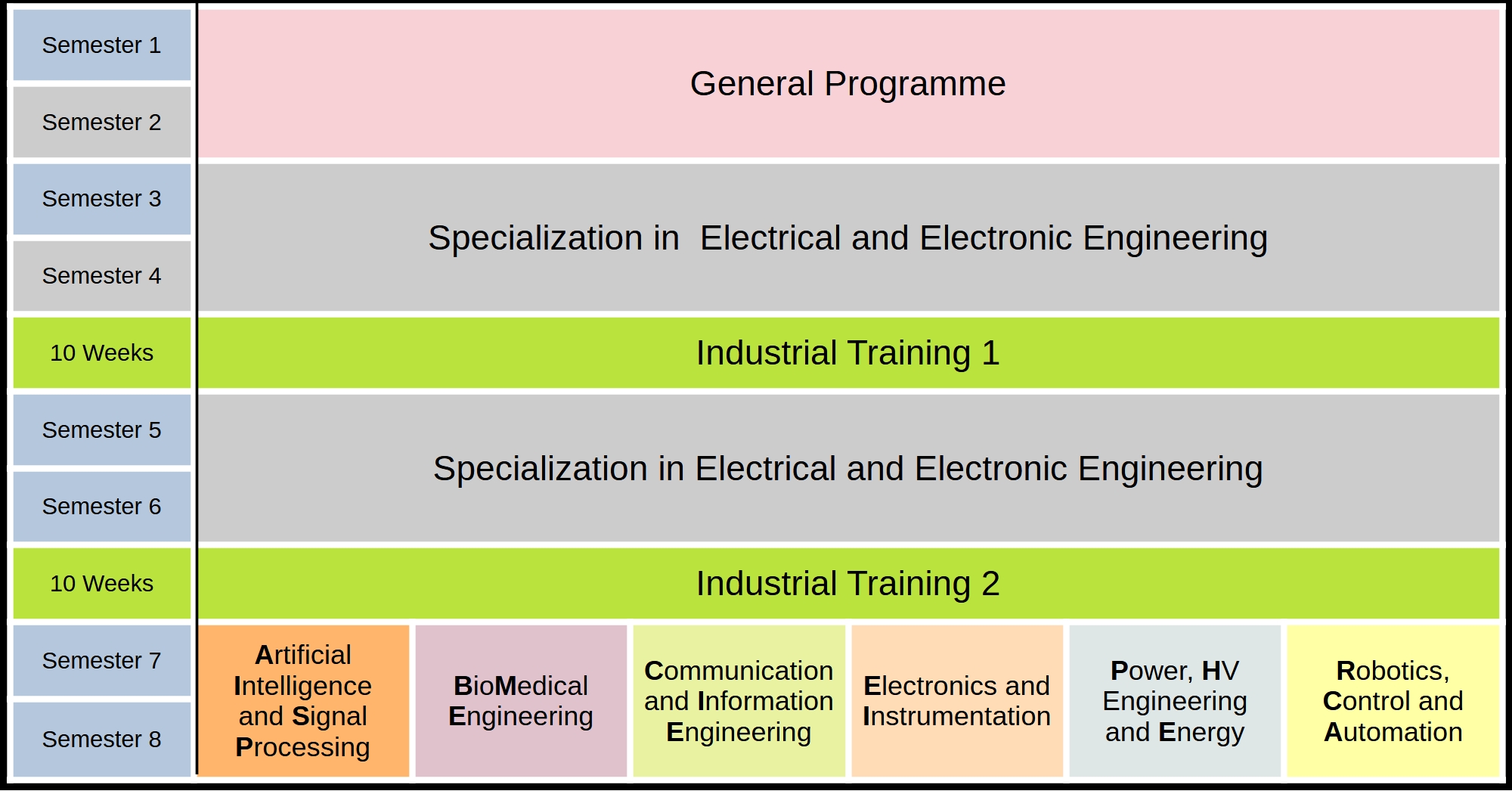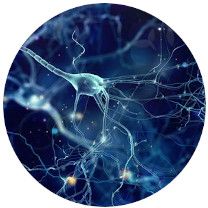Undergraduate Programme
The course in Electrical and Electronic Engineering is designed to equip the student with a sound knowledge and understanding of all the sub disciplines of electrical and electronic engineering. Further, in depth practical knowledge, high degree of analytical skills, ability to handle subject specific simulation tools, ability to handle software-based applications, sound knowledge in design, and development of the soft skills throughout the degree course provide the best combination for a students to graduate as a well-qualified electrical and electronic engineer. In addition, a good grasp of civil and mechanical engineering theory and practice and industrial training is also considered essential.
Graduate Profile
"The Graduate will produce engineering designs that are innovative, based on sound principals, sustainable, environmentally sound, and adhering to the ethical guidelines. He/she will be an effective leader in the chosen career and in the society. The graduate will pursue lifelong learning and be a member and leader of professional organizations"
A detailed GRADUATE PROFILE can be found here.
Programme Structure
The Undergraduate Programme offered by the Department of Electrical and Electronic Engineering
University of Peradeniya has the following structure:

The degree program is designed for completion within four academic years. Each academic year has 2 semesters of 15 week duration and a long vacation of about 14 weeks. During a single semester, a student can enroll up to 24 credits of courses being offered. The courses are organized at five different levels indicated by the course numbers in 100, 200, 300, 400 (based on academic year) and 500 series (elective courses).
The UG program is separated into two stages: General Program (GP) in Engineering covering 100 level courses and the Specialization Program in Engineering covering the courses 200 level and above. The General Program is common to all the students entering the Faculty of Engineering. At the end of the GP, students are streamed into specializations based on their academic performance and their personal preferences. Electrical and Electronic Engineering is one of the most sought after disciplines among the students for many years. In both the General and Specialization programs have courses with contributions to (i) Mathematics, Basic sciences and Computing, (ii) Engineering Sciences & Engineering Design: Projects, and (iii) Complementary Studies: Management, Engineering economics, Communications, Humanities & Social sciences, and Engineering ethics.
In the Specialization Program, theory and practice are developed further through lectures, experiments, designs and project work. Subjects in areas such as electrical measurements, electronics, electrical power, telecommunications, systems & control, electrical machines, power systems, embedded systems, digital systems, and programming are taught as core courses throughout the program. Laboratory work consisting of practical and experimental studies, design work, relating to the main engineering subjects are undertaken in small groups. For more details of the course structure in EE Specialization program see below.
In the 200 level, the Specialization courses provide the essential technical knowledge that electrical and electronic engineers must possess. These also include courses on network analysis, signals and systems, measurements, electronics, electrical power and energy, and programming.
In the 300 and 400 levels, students are exposed to analysis and design in order to solve complex engineering problems. Students possess a good understanding of engineering concepts by the time they enter the 400 level.
The research projects are offered in the 400 level which are often based on open-ended electrical and electronic engineering problems. Such project activities provide a deep understanding of a subject area meeting analytical, research and design interests of the individuals. The students are also given the opportunity to demonstrate their creative abilities while interacting with academic staff via the project study. In addition, the projects will enhance the students’ capability to perform in a group of multi-disciplinary interests where teamwork, leadership and communication skills are essential.
In addition to the core courses, a wide range of electives are available for students to broaden their outlook. Technical elective courses allow the students to learn to a great depth in specialized areas of interest while General electives enable them to gain a broader perspective of their role as professionals.
Industrial training is given to all undergraduates after their 4th and 6th semesters (end of second and third year levels) in general and specialized field of study. However, in line with the objectives of the Department Career Guidance program, that is to motivate the DEEE students to decide the career path as early as possible, the department encourage the students to select Industrial Training according to their intended area of focus as the initial step of their career planning process. The total duration of the industrial training is 24 weeks (6 Credits). The industrial training is a compulsory part in engineering degree program and completion of the industrial training to the satisfaction of the faculty is a requirement for the successful completion of the final course in engineering. If any student who fails to attend the required standards in the industrial training program, he/she will be required to undergo further training to be eligible for the award of the degree of Bachelor of the Science of Engineering. The final grade of the industrial training component is included in the academic transcript as well. Read more ...
Credit Requirement of the EEE Specialization
| Award of BSc. Eng. Degree | Award of BSc.Eng. Degree with Class Honours | ||
|---|---|---|---|
| 1 | General Program | 36 | 36 |
| 2 | Core Courses | 75 | 78 |
| - Regular Courses and design Projects | 72 | 72 | |
| - Research Project | 3 | 6 | |
| 3 | Elective Courses | 21 | 30 |
| - Technical Electives | 9 | 15 | |
| - General Electives | 12 | 15 | |
| 4 | Industrial Training | 6 | 6 |
| TOTAL | 138 | 150 |
The General Programme offered by the Faculty of Engineering
The General Programme in Engineering, which is conducted in the first academic year, is a common programme for all the students at the Faculty of Engineering. There are twelve courses to be completed under the General Programme, which consists of two semesters. Key modules, such as mathematics, computing, mechanics, thermodynamics, electricity, engineering materials, along with the practical aspects of engineering measurements, engineering drawing, fundamentals of manufacture and communication in English are offered under this program. Laboratory assignments, fieldwork, drawing office work and workshop practices form a part of the General Program and these are continuously assessed. A student should have successfully or provisionally completed the General Programme in Engineering in order to continue studies for the Specialization Programme in Engineering. See the Handbook for Rules and Regulations.
| SEMESTER | COURSE CODE | COURSE TITLE | CREDITS |
|---|---|---|---|
| 1 | GP101 | English I | 3 |
| GP109 | Material Science | 3 | |
| GP110 | Engineering Mechanics | 3 | |
| GP112 | Engineering Measurements | 3 | |
| GP114 | Engineering Drawings | 3 | |
| GP115 | Calculus I | 3 | |
| 2 | GP102 | English II | 3 |
| GP106 | Computing | 3 | |
| GP111 | Elementary Thermodynamics | 3 | |
| GP113 | Fundamentals of Manufacture | 3 | |
| GP116 | Linear Algebra | 3 | |
| GP118 | Basic Electrical and Electronic Engineering | 3 | |
| TOTAL | 36 | ||
Course Structure for the Specialization in Electrical and Electronic Engineering
The department provides basic courses for all engineering undergraduates on the principles of Electrical and Electronic Engineering, in appropriate depth, to acquire essential fundamentals, and also it offers several advanced courses to the specializing students. Appropriate selection of technical electives that are available from within the above six subspecialisations, backed by the undergraduate research project and industrial training engagements, pave the way for the students of electrical and electronic engineering to specialize in one of the above subdisciplines. More importantly, the curriculum of the Electrical and Electronic Engineering study program has been designed in a flexible way that, students can obtain a major specialization in one of the above areas while obtaining a minor specialization in another area selected out of the same six sub-disciplines mentioned above.
| (YEAR) | SEMESTER | CODE | TITLE | CREDITS | PRE-REQUISITES |
|---|---|---|---|---|---|
|
(2) 200 Level |
3 | EE201 | Network Analysis | 3 | - |
| EE251 | Principles of Electrical Measurements | 3 | - | ||
| EE252 | Electronic Devices and Circuits | 3 | - | ||
| EE253 | Digital Logic Design | 3 | - | ||
| EM211 | Ordinary Differential Equations | 2 | - | ||
| EM213 | Probability & Statistics | 2 | - | ||
| ME211 | Mechanics of Machines | 3 | - | ||
| 4 | EE254 | Electronic Instrumentation | 3 | - | |
| EE255 | Electric Power | 2 | - | ||
| EE256 | Power and Energy | 2 | - | ||
| EE257 | Signals and Systems | 3 | - | ||
| CO253 | Introduction to Programming and networking for Electrical Engineering | 3 | - | ||
| EM212 | Calculus II | 2 | - | ||
| ME210 | Thermodynamics for Electrical and Electronic Engineers | 2 | - | ||
|
(3) 300 Level |
5 | EE320 | Electromagnetic Theory | 2 | - |
| EE322 | Embedded Systems Design | 3 | EE253, CO253 | ||
| EE325 | Digital Signal Processing | 3 | EE257 | ||
| EE351 | Electronic Circuits | 3 | EE252 | ||
| EE352 | Automatic Control | 2 | EE257 | ||
| EE358 | Electrical Machines | 3 | EE255, EE256 | ||
| EM316 | Numerical Methods for Electrical and Electronic Engineers | 2 | EM211, EM212 | ||
| 6 | EE353 | Discrete Time Control Systems | 3 | EE352, EE325, EE358 | |
| EE354 | Power Engineering | 3 | EE358 | ||
| EE355 | Applied Electromagnetics | 3 | EE320 | ||
| EE356 | Electronic Product Design and Manufacture | 3 | - | ||
| EE357 | Communication Systems | 3 | EE201, EE257 | ||
| General Electives | 3 | - | |||
|
(4) 400/500 Level |
7 | EE401/EE512 | Communication Theory | 3 | EE357 |
| OR | |||||
| EE402/EE501 | Advanced Control Systems | 3 | EE352, EE353 | ||
| OR | |||||
| EE403/EE559 | Integrated Analog Electronic Circuits | 3 | EE252, EE351 | ||
| OR | |||||
| EE404/EE572 | Electric Power Systems | 3 | EE354 | ||
| EE405 | Undergraduate Project - I | 3 | - | ||
| Technical/General Electives | |||||
| 8 | Technical/General Electives | ||||
| EE406 | Undergraduate Project - II | 3 | - | ||
Recommended Technical Elective Courses
for the Specialization in Electrical and Electronic Engineering
In the Electrical and Electronic Engineering specialization program, there are 6 sub specializations identified by the department as mentioned above. The recommended Technical Elective courses under the sub-specializations: Artificial Intelligence and Signal Processing (AISP), Biomedical Engineering (BME), Communication and Information Engineering (CIE), Electronics and Instrumentation Engineering (EI), Power High Voltage and Energy Systems Engineering (PHE), and Control, Robotics and Automation Engineering (RCA), are listed below.
| SEM. | CODE | TITLE | CREDITS | PRE-REQ. | AISP | BME | CIE | EI | PHE | RCA |
|---|---|---|---|---|---|---|---|---|---|---|
| 7 | EE401/EE512 | Communication Theory | 3 | EE357 | X | |||||
| 7 | EE402/EE501 | Advanced Control Systems | 3 | EE352, EE353 | X | |||||
| 7 | EE403/EE559 | Integrated Analog Electronic Circuits | 3 | EE252, EE351 | X | X | ||||
| 7 | EE404/EE572 | Electric Power Systems | 3 | EE354 | X | |||||
| 7 | EE512 | Communication Theory | 3 | EE357 | X | |||||
| 7 | EE539 | Nonlinear and Multivariable Systems | 3 | EE352 or ME306 | X | X | ||||
| 7 | EE552 | VLSI Design | 3 | EE253, EE351 | X | |||||
| 7 | EE554 | Microwave Techniques | 3 | EE320, EE355 | X | X | X | X | X | X |
| 7 | EE575 | Power Electronic Applications and Design | 3 | EE351 | X | X | X | |||
| 7 | EE576 | High Voltage Engineering | 3 | EE255, EE256 | X | |||||
| 7 | EE580 | Introduction to Biomedical Engineering | 3 | EE252 or EE281 or EE285 | X | |||||
| 7 | EE596 | Image and Video Coding | 3 | EE257, EE325 | X | X | X | |||
| 8 | EE511 | Antennas and Propagation | 3 | EE320, EE355 | X | |||||
| 8 | EE514 | Data Communications | 3 | EE357 | X | |||||
| 8 | EE518 | Digital Communications | 3 | EE512 | X | |||||
| 8 | EE522 | Telecommunication and Wireless Systems | 3 | EE357 | X | |||||
| 8 | EE538 | Electric Machines and Drive Systems | 3 | EE358, EE352, EE354 | X | X | ||||
| 8 | EE561 | Industrial Instrumentation | 3 | EE251, EE254 | X | X | X | |||
| 8 | EE587 | Digital Systems Design and Synthesis | 3 | EE252, EE322 | X | |||||
| 8 | EE590 | Speech Recognition and Synthesis | 3 | EE325 | X | X | X | X | ||
| 8 | EE592 | Modern Power Systems | 3 | EE572 | X | |||||
| 8 | EE593 | Advanced Signal Processing | 3 | EE257, EE325 | X | X | X | X | X | |
| 8 | EE594 | Industrial Robotics and Automation | 3 | EE352 or ME306 | X | |||||
| 8 | EE595 | Machine Intelligence and Smart Systems | 3 | EM201 | X | X | X | X | X | |
| 8 | EE599 | Audio Engineering and Acoustics | 3 | - | X | X | X | X |
Recommended General Elective Courses
for the Specialization in Electrical and Electronic Engineering
Technical Elective courses allow the students to learn to a great depth in specialized areas of interest while General Electives (Complimentary Subjects or GE) enable them to gain a broader perspective of their role as professionals. GE courses are coordinated by the Engineering Education Unit (EEU) of the Faculty of Engineering. Some course details can be found here. The Department recommend the following minimum requirement for the general electives:
⮚ EF530: Engineering Management AND at least 5 more credits should be taken from the modules defined under the category Management, Economics & Law of the following table
⮚ At least 2 credits should be taken from the modules defined under the category Arts/Humanities of the following table
⮚ At least 2 credits should be taken from the modules defined under the category Politics/Social Sciences of the following table
| CATEGORY | CODE | TITLE | CREDITS |
|---|---|---|---|
| Management, Economics and Law | EF530 | Engineering Management | 3 |
| CP551 | Sustainable Development | 3 | |
| EF509 | Engineer as an Entrepreneur | 3 | |
| EF521 | Intellectual Property | 1 | |
| EF524 | Business Law | 3 | |
| MA501 | Accounting and Finance for Engineers | 3 | |
| MA503 | Business Communication | 2 | |
| MA505 | Business Law and Intellectual Property | 3 | |
| MA507 | Management of Technology | 3 | |
| MA520 | Economics for Engineers | 2 | |
| MA522 | Engineer as and Entrepreneur | 3 | |
| MA524 | Organizational Behavior and Human Resources Management | 3 | |
| MA526 | Project Management | 2 | |
| Arts/Humanities | EF501 | Engineer in Society | 2 |
| EF519 | Written English for Communication | 1 | |
| EF520 | Effective Communication in English Through Speech | 1 | |
| EF528 | Introduction to Digital Art | 3 | |
| EF531 | Mindfulness for Engineers | 2 | |
| Politics/Social Sciences | EF501 | Engineer in Society | 2 |
| EF511 | Social Project | 2 | |
| CP551 | Sustainable Development | 3 |
Details of the Courses
Course summary, Aim, Intended Learning Outcomes (ILOs) and Sub topics for individual courses can be found here.
Department provides students with core course modules, technical electives, projects and other facilities in order them to SPECIALIZE in one or more of the following SUB-DISCIPLINES under the hood of Electrical and Electronic Engineering.

ARTIFICIAL INTELLIGENCE AND SIGNAL PROCESSING
Artificial intelligence, machine learning, omputer vision, remote sensing, signal and image processing, etc.

BIOMEDICAL ENGINEERING
Bio-electromagnetism, bioinstrumentation, biomaterials, biomechanics, medical imaging systems and signal processing, etc.

COMMUNICATION AND INFORMATION TECHNOLOGY
Analog and digital communication, data and computer networks, electromagnetism, antennas and propagation, microwave techniques and wireless communication, etc.

ELECTRONICS AND INSTRUMENTATION
Electronic devices, analysis and design of electronic circuits, digital logic systems, microprocessors, peripheral interfacing, digital system synthesis, VLSI design, etc.

POWER, ENERGY AND HIGH VOLTAGE
Electric power, energy, generation, transmission and distribution, power systems, system stability, protection, high voltage phenomena, insulators, breakdown scenarios, etc.

ROBOTICS, CONTROL AND AUTOMATION
Classical and modern control theory, discrete time control systems, theory of estimators, system identification, nonlinear control, real-time systems, industrial manipulators and automation, mobile robots, and dynamics, etc.
More details of the Sub-disciplines
DEEE students can specialize in one or more of the above sub-disciplines.


